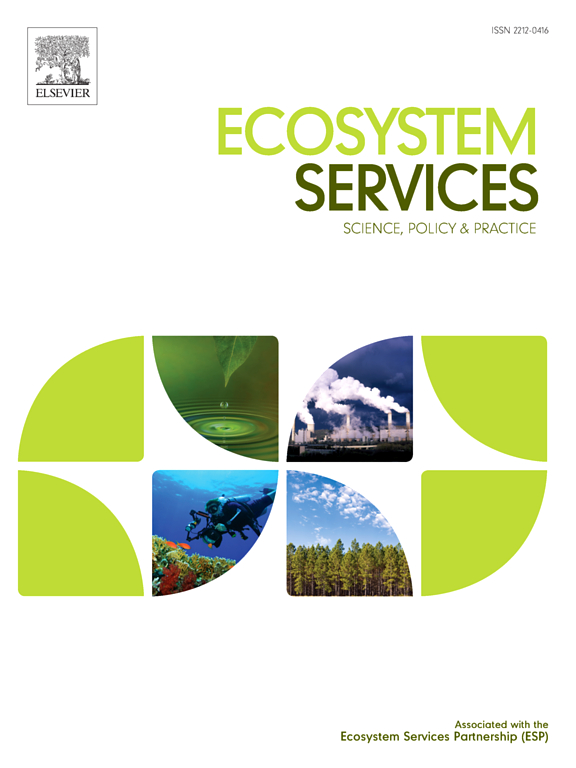The Benefits Knowledges Learning Framework: a tool for learning across diverse knowledge systems in ecosystem valuation
IF 6.6
2区 环境科学与生态学
Q1 ECOLOGY
引用次数: 0
Abstract
Sustainable and just environmental management depends on meaningful consideration of the plural values of nature, as they arise in association with diverse worldviews and understandings of well-being. To achieve value pluralism in decision-making, we must also attend to knowledge pluralism, in terms of recognizing the validity and decision relevance of a broader suite of knowledge forms that convey diverse understandings of well-being and benefit. In this article, we outline a social learning tool – the Benefits Knowledges Learning Framework – that supports expanded thinking about decision-relevant, actionable knowledge, and the associated spectrum of available opportunities to learn from these diverse knowledge forms across phases of decision-making. It does so through: 1) cultivation of reflexivity and mutual learning about the knowledge systems of diverse actors involved in the decision process; 2) identification of diverse benefits knowledge forms that are available to inform decision-making; and 3) identification of opportunities to learn from these knowledge forms. Diverse forms of benefits knowledge include both knowledge products (documentation) and knowledge practices (lived and embodied). The framework can be applied to retrospective case analysis to understand and learn from constraints and enabling factors in past decision processes. It can also be applied to assess on-going decision-making and identify current opportunities for improvement. The framework begins with a start-up phase that encourages those applying the framework to address any concerns raised by stakeholders and rightsholders and determine whether framework application is appropriate in a particular context.
利益知识学习框架:在生态系统评估中跨不同知识系统学习的工具
可持续和公正的环境管理取决于有意义地考虑自然的多元价值,因为它们与不同的世界观和对福祉的理解有关。为了实现决策中的价值多元化,我们还必须关注知识多元化,即认识到传达对福祉和利益的不同理解的更广泛的知识形式的有效性和决策相关性。在本文中,我们概述了一种社会学习工具——利益知识学习框架,它支持对决策相关的、可操作的知识的扩展思考,以及相关的可用机会,以便在决策的各个阶段从这些不同的知识形式中学习。它通过:1)培养反身性和相互学习参与决策过程的不同行动者的知识系统;2)识别可用于决策的各种利益知识形式;3)识别从这些知识形式中学习的机会。各种形式的利益知识包括知识产品(文档)和知识实践(生活和具体化)。该框架可以应用于回顾性案例分析,以理解和学习过去决策过程中的制约因素和使能因素。它也可用于评价正在进行的决策和确定当前的改进机会。该框架从启动阶段开始,该阶段鼓励应用该框架的人解决利益相关方和权利持有人提出的任何问题,并确定框架应用是否适用于特定环境。
本文章由计算机程序翻译,如有差异,请以英文原文为准。
求助全文
约1分钟内获得全文
求助全文
来源期刊

Ecosystem Services
ECOLOGYENVIRONMENTAL SCIENCES&-ENVIRONMENTAL SCIENCES
CiteScore
14.90
自引率
7.90%
发文量
109
期刊介绍:
Ecosystem Services is an international, interdisciplinary journal that is associated with the Ecosystem Services Partnership (ESP). The journal is dedicated to exploring the science, policy, and practice related to ecosystem services, which are the various ways in which ecosystems contribute to human well-being, both directly and indirectly.
Ecosystem Services contributes to the broader goal of ensuring that the benefits of ecosystems are recognized, valued, and sustainably managed for the well-being of current and future generations. The journal serves as a platform for scholars, practitioners, policymakers, and other stakeholders to share their findings and insights, fostering collaboration and innovation in the field of ecosystem services.
 求助内容:
求助内容: 应助结果提醒方式:
应助结果提醒方式:


